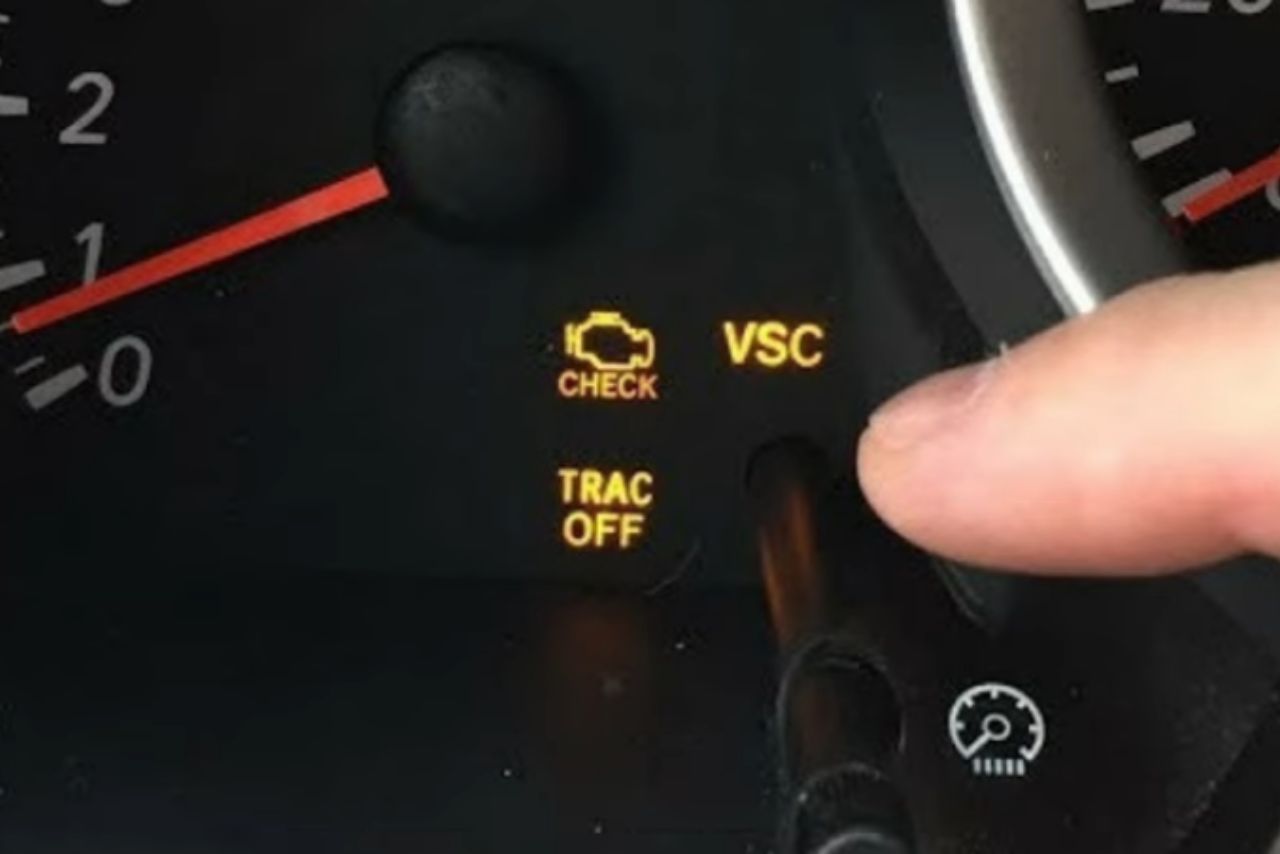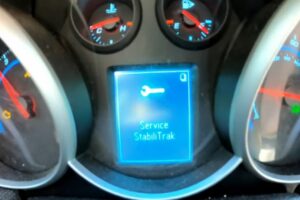So, you’ve found yourself in a bit of a jam with your ‘Trac Off’ and ‘Check Engine’ lights blinking on your Toyota dashboard? Don’t hit the panic button just yet!
These Trac Off and Check Engine Light Toyota warning lights are simply your car’s way of communicating issues that need to be addressed. This could range from minor concerns like a loose gas cap to more serious problems such as malfunctioning sensors or systems.
In this article, we’ll help you understand what these lights mean, potential causes and solutions to get them off your dashboard, ensuring smooth sailing (or rather driving) for you hereafter!
Trac Off: This indicates your traction control system is deactivated. This can happen automatically if the Check Engine light is on or manually by pressing the Traction Control button. Check Engine: This light signifies a potential engine malfunction. It could be anything from a loose gas cap to a more serious issue.
Table of Contents
What Does the Trac Off Light Mean in a Toyota?
The “Trac Off” light in your Toyota is an indicator that the Traction Control System (TCS) has been disengaged. Here’s what you need to know:
Possible Reasons for Trac Off Light Illumination:
| Issue | Solution |
|---|---|
| Pushed TRAC OFF button unintentionally | Press the button again |
| Faulty wheel speed sensors | Get them checked/replaced by professional |
| Problem with steering angle sensor | Professional repair needed |
Remember, while driving without traction control isn’t necessarily dangerous under normal conditions – it can make handling more difficult on slippery roads! If ‘Trac Off’ light doesn’t go off after pressing button again or if car handles differently, consult professionals immediately.
Understanding the Check Engine Light in a Toyota:

The check engine light on your Toyota’s dashboard isn’t there to annoy you. It’s an early warning system. Here are some key points:
Possible Causes for Check Engine Light:
Here are some common triggers:
| Issue | Potential Impact |
|---|---|
| Loose Gas Cap | Decreases fuel efficiency |
| Worn Spark Plugs | Can damage catalytic converter |
| Oxygen Sensor Failure | Increases vehicle emissions |
When You Should Visit a Mechanic:
If your ‘check engine’ light is flashing rather than staying steady, it usually means there’s something seriously wrong that needs immediate attention – don’t ignore it!
Remember: Regular maintenance checks can help prevent most issues before they become serious problems!
Common Causes of Trac Off and Check Engine Light Toyota:
When the Trac Off and Check Engine lights illuminate on your Toyota dashboard, it can be quite alarming. Don’t panic! Here’s a quick rundown of some common causes:
| Cause | Possible Effect |
|---|---|
| Faulty Oxygen Sensor | Lowered fuel efficiency |
| Loose Fuel Cap | Increased fuel evaporation |
| Bad Spark Plugs/Ignition Coils | Poor engine performance |
Faulty Oxygen Sensor
- Leads to lowered fuel efficiency.
- Can cause damage to the catalytic converter.
Loose Fuel Cap:


Bad Spark Plugs/Ignition Coils
- Can create issues such as poor engine performance and difficulty during ignition.
Knowledge is power when dealing with car troubles; being aware of these common causes can help you address potential problems early!
How to Diagnose Trac Off and Check Engine Light Issues?
When the “Trac Off” and check engine light illuminate on your Toyota dashboard, it’s an indication of a potential problem with your vehicle. Here are some steps you can take to diagnose this issue:
Use a Diagnostic Tool:
Plug in a OBD-II scanner into the port under your car’s dashboard. Read the error code(s) displayed.
Analyze Error Codes:
- Pxxxx codes relate to powertrain issues
- Bxxxx codes signify body problems
- Cxxxx codes pin-point chassis concerns
- Uxxxx indicate network communication errors
Common Causes:
| Light | Possible Cause |
|---|---|
| Check Engine Light | Faulty spark plugs, malfunctioning oxygen sensor, loose gas cap |
| Trac Off Light | Issues with ABS system |
Physical Inspection:
If no codes or unclear ones appear, physically inspect these areas:
- Exhaust System for leaks or damage
- Gas Cap for correct fitment and seal integrity
Remember that while the above methods can help pinpoint possible causes, they might not completely resolve complex issues requiring professional intervention.
Watch this video to fix this issue:
Step-by-Step Guide to Resetting the Trac Off and Check Engine Lights:
Follow these simple steps to reset your Toyota’s Trac Off and Check Engine lights:
If you’ve followed this guide correctly but still see lights illuminated, it signifies a deeper problem that needs professional attention:
| Light Still On | Possible Issue |
|---|---|
| Trac Off Light | Traction control issues |
| Check Engine Light | Wide range of engine problems |
In such instances, it is advisable not to ignore these warnings – fix them immediately by taking your Toyota into a local dealership or trusted mechanic.
Tips for Preventing Trac Off and Check Engine Light Problems:

Regular maintenance of your Toyota is crucial to avoid any ‘Trac Off’ or ‘Check Engine’ light problems. Here are some preventative steps you can take:
Here’s an easy-to-follow table that summarizes regular maintenance work:
| Maintenance Task | Frequency |
|---|---|
| Oil Change | Every 5000 miles |
| Brake Inspection | Twice a year |
| Engine Inspection | Annually |
But remember – if your ‘Trac off’ or ‘Check engine’ lights come on, don’t ignore them! They indicate potential issues which might need immediate attention. Always consult with a professional mechanic when these lights appear.
When to Seek Professional Help for Trac Off and Check Engine Light Troubles?
When it comes to your Toyota’s “Trac Off” and check engine light, there are instances where you might need professional assistance.
Here are some scenarios when you should immediately consult with a professional:
- Your vehicle is producing excessive exhaust smoke.
- The engine is making unusual noises.
- There’s an increase in fuel consumption.
| Symptoms | Possible Issue |
|---|---|
| Flashing Check Engine Light | Serious Misfire |
| Reduced Power Warning | Failing System |
Remember, while some issues may be minor, others can lead to bigger problems down the road if not addressed promptly. Don’t ignore these warning signs!
Top Maintenance Tips for Keeping Your Toyota’s Warning Lights at Bay:
Keeping your vehicle in top shape minimizes the risk of seeing the dreaded Trac Off and Check Engine lights. Here are some maintenance tips to keep those warning lights off.
Here is a simple table of recommended maintenance schedules:
| Maintenance Task | Frequency |
|---|---|
| Change oil | Every 5k-7.5k miles |
| Replace air filter | Every 15k-30k miles |
| Coolant flush | Every 30k miles |
Follow these tips regularly and you’ll likely see fewer instances of that pesky Trac Off or Check Engine Light turning on!
Frequently Asked Questions About Trac Off and Check Engine Lights in Toyotas
What does it mean when the Trac Off light comes on in my Toyota?
The ‘Trac Off’ light indicates that the Traction Control System has been deactivated. It might come on due to a variety of reasons, such as low tire pressure or problematic wheel sensors.
Why are both my Check Engine and Trac Off lights lit up?
If both these lights illuminate simultaneously, it could indicate an issue with your engine management system. This often triggers the car’s computer to turn off certain systems (like traction control) as a safety measure.
| Light On | Possible Cause |
|---|---|
| Both | Faulty sensor |
| Both | Ignition coil issues |
Should I be worried if these lights stay on?
Yes, you should get your vehicle checked out by a professional mechanic promptly if either of these warning lights stays illuminated for an extended period.
Can I still drive my Toyota with these warning lights on?
While your vehicle may still operate normally even with these warning lights on, it is not recommended to continue driving without addressing the potential underlying problem—doing so could result in severe damage over time.
Conclusion and final thoughts
When your Toyota starts flashing the “Trac Off” and “Check Engine” lights, don’t hit the panic button. These warning signals are not a death sentence for your vehicle but rather an opportunity to maintain its optimal performance.
Regularly checking on these alerts can save you from hefty repair costs down the line.
Remember, understanding what causes these light indicators to turn on is half the battle won.
Whether it’s a minor issue like a loose gas cap or something more serious that needs professional attention, addressing them promptly will ensure your Toyota continues running smoothly for miles to come.
Latest Posts:
- Can WD-40 Remove Scratches on Cars? (Hint: Yes, but…)
- Can You Use a Drill to Polish Your Car? (We Tried it Out!)
- Should You Cover Car Scratches With Stickers? (REVEALED!)
- Buick Service Stabilitrak: (Causes & 100% Guaranteed Fix!)
- Common Holden Trax Problems (Causes & 100% Proven Fixes!)
- Jeep Commander Transmission Over Temp: (Guaranteed Fix!)












Leave a Reply